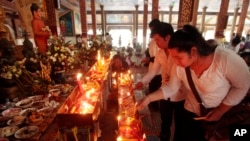Cambodia’s annual ritual of Pchum Bun has begun, in a 15-day religious ceremony that honors the spirits of the dead. Many Cambodians were up in the pre-dawn Monday, visiting pagodas, where they threw balls of rice into the dark to feed wandering ghosts, those spirits who never received a proper funeral.
The rituals continue this week and next, with monks waking very early to chant, and more people arriving to make offerings, in one of the country’s most important annual rituals.
San Souy, a teacher at Sihanouk Reach High School and a layman at the Wat Koh pagoda, told VOA Khmer that the ancient rice-throwing ceremony remains popular. The name Pchum Ben comes from Pali and means “a collection of rice balls.” It is especially popular the first day of the ceremony, with the number of visitors tapering off after that, he said. “Only on Saturday and Sunday, we can see a lot of people coming, because government officials have their day off work and come to throw rice balls.”
Song Siv, a monk and director of the Ethics Center, said Pchum Ben gives blessings to the “preta,” or ghosts, but it also endows pace and prosperity and is a time of national harmony and reconciliation.
This year’s ceremony runs through Oct. 13, during which many people will visit pagodas, offering food to monks and paying respect to dead relatives. This is accompanied by a lot of activity outside the temple, such as Wat Koh on Monday, where sellers of flowers, incense and candles, as well as tuk-tuk and moto-taxi drivers, hoped to earn some extra money from all the activity.
One reveler, Grandmother Chuon Nai, said she kept faith in Pchum Ben, which she attends every year, as she does all religious holidays. “We want to send blessings to our relatives who have passed away, for them to come and take up these blessings,” she said.




